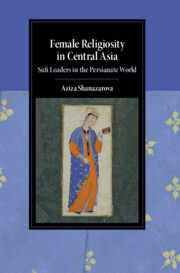
- Publisher:
- Cambridge University Press
- Online publication date:
- April 2024
- Print publication year:
- 2024
- Online ISBN:
- 9781009386371


Through revealing the fascinating story of the Sufi master Aghā-yi Buzurg and her path to becoming the 'Great Lady' in sixteenth-century Bukhara, Aziza Shanazarova invites readers into the little-known world of female religious authority in early modern Islamic Central Asia, revealing a far more multifaceted gender history than previously supposed. Pointing towards new ways of mapping female religious authority onto the landscapes of early modern Muslim narratives, this book serves as an intervention into the debate on the history of women and religion that views gender as a historical phenomenon and construct, challenging narratives of the relationship between gender and age in Islamic discourse of the period. Shanazarova draws on previously unknown primary sources to bring attention to a rich world of female religiosity involving communal leadership, competition for spiritual superiority, and negotiation with the political elite that transforms our understanding of women's history in early modern Central Asia.
‘This ground-breaking study, well documented and well written, adds new and surprising facets to the history of Islam in Central Asia: unexpected insight into the gender aspects of Sufism in the region. An important contribution, central for students of Islam and also for those interested in gender studies.’
Jürgen Paul - Universität Hamburg
‘This book represents exemplary scholarship in Islamic studies. Rooted in overlooked archival materials, it contains a rich and nuanced analysis of the conjunction between gender, age, religious expression and authority, and the evolution of social memory over a long period. It is also an essential new resource for the study of Central Asia’
Shahzad Bashir - Brown University
‘A groundbreaking, meticulously researched work. It represents a major contribution to scholarship on Islam in Central Asia and on the role of women as authority figures, with implications that go far beyond its geographical focus.’
Jamal J. Elias - University of Pennsylvania
‘Shanazarova’s groundbreaking book offers a reassessment of the prevailing understanding of gender history in early modern Central Asia through her astute analysis of the narrative traditions of a little-known sixteenth-century female Sufi master, Aghā-yi Buzurg, who lived in Bukhara during the post-Timurid era of Shibānid rule in Central Asia and the rise of the Shīʿī Safavid dynasty in Iran. This book is a must-read for scholars and students of women and gender, Sufism, and narrative traditions in early modern Central Asian and Islamic history.’
Jo-Ann Gross - Professor Emerita, The College of New Jersey
‘Shanazarova’s deeply researched and highly original study of a 16th-century female Sufi master opens astounding insights into the study of women and religious authority in Islamic Central Asia. Female Religiosity represents a major contribution to early modern Central Asian history.’
Scott C. Levi - The Ohio State University
 Loading metrics...
Loading metrics...
* Views captured on Cambridge Core between #date#. This data will be updated every 24 hours.
Usage data cannot currently be displayed.